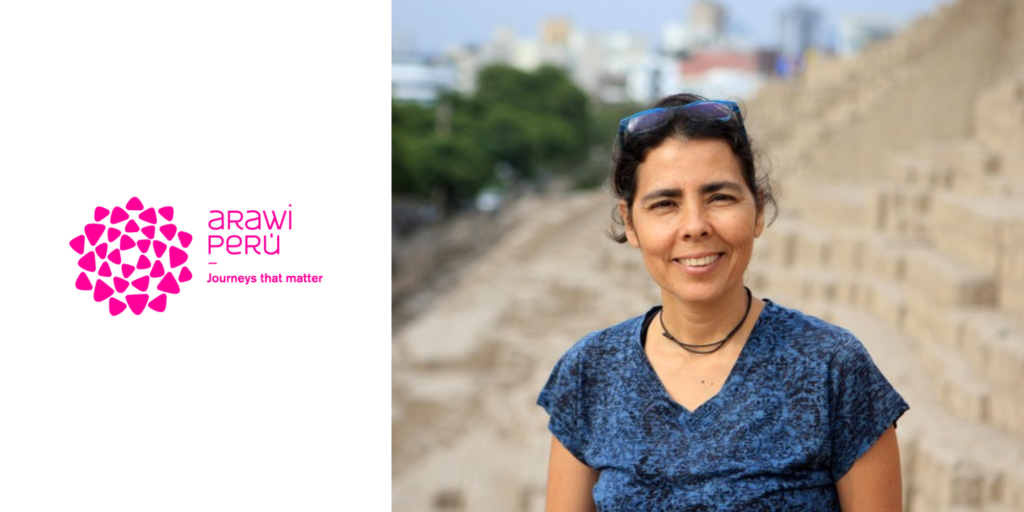Meet Tati from Arawi Peru

Arawi Peru’s catchphrase is ‘Journeys that matter’ and it’s an ethos that drives both founding director Tati Quiñones and her company’s exceptional holidays. With a background in photojournalism in her native Lima, Tati made a career of exploring Peru and capturing its people and places. When she moved to Barcelona in 2000, she wanted to share that vision of her country.
“In Europe, people have this idea of Peru being the poor lady of the Andes and I wanted to change that. I wanted to show the other side, the drive the people from the Andes have. Because Machu Picchu is so renowned that’s the only thing that gets stuck in your mind, but 65% of Peru is jungle – there’s nature to explore, as well as archaeology, and the amazing rural communities.”
The idea for Arawi Peru – offering tailor-made, sustainable travel experiences throughout Peru – started to take hold in 2007, before being implemented fully in 2013. The initial start came with Tati organising special tour itineraries for Spanish universities – for example, an archaeology themed tour for students travelling for an excavation. As it started to expand, finding a partner in Peru who could provide start-up capital proved crucial.
“We were able to make a business proposal with a margin of two years without worrying about making profits, just investing that money in marketing and investigating new trips.
After two years, we were able to stand out on our own feet.”

The company now operates with a team based in Peru handling operations and a Barcelona office. Tati’s business partner in Spain is an anthropologist and the fact neither has a strict tourism background allows a strong focus on a different sort of holiday.
“Most of our clients are those willing to go a little further. The people who really want to get to know the country, not just the highlights from the pictures,” Tati says.
“Take the example of Vinicunca and the Rainbow Mountain; everybody wants to go. I’m not saying I’m not going to sell Vinicunca, but I’m going to tell you what the problems are around climate change, and that it used to be hidden by snow. And the communities living around it are profiting, that’s good, but the environment is degrading. So, I’m going to take you there, but I’m going to make you see it differently. And it’s not just a full day there and leave; I’m going to suggest you stay in one of these communities.”

Tourwriter provides the tech
Tati’s background in the communications field meant she was quick to adopt technology to support her business.
“I knew that to have a platform that could help us not just quote, but build the itineraries was very crucial. When you do it manually, you tend to make mistakes, you might miss, for example, one day, or put Saturday instead of Sunday.”
She tried one software product, but it proved more complicated and more expensive than expected. Then, when the pandemic came, there was time to review her options and she trialled Tourwriter.
“We were without clients, but we said we’ll try. With the pandemic I had time to log all the information, the prices, that takes time. And we really liked it. It is constantly making improvements. The communication is so good, and the support is always there.
“And it has been for us, really, the face of the company. You get these itineraries with huge lovely pictures and it’s really user friendly. I send the link, and what we find very, very useful is to send the guide who’s working with the traveller the itinerary link via WhatsApp. Because all the tours we do are tailor-made, he or she knows the exact itinerary the traveller has and their interests.”
Tati QuInones – Founder of ARAWi PERU
It also helps with conversion: “A lot of my customers are referrals, they say ‘please send me the link so I can show it to my friend’,” Tati adds.
“But what I like the most is access to the resources in our database. If I want to talk about the importance of going to the jungle, or talk about communities, I can just put those notes in the itinerary.”

A positive future
The post-pandemic trend towards more transformative and regenerative tourism aligns strongly with Arawi Peru’s ethos. “Arawi is a Quechua word for poem or song to nature. For us this translates into routes where small gestures and actions make our environment better,” Tati notes.
“Post-Covid, people are much more open to our proposals. For many of the other agencies that are just beginning to include this it’s just a marketing campaign. But we are in a good position because we’ve always been doing this.
“We’re expanding. I have regular Andean communities we use in our itineraries, but I think it’s important to add new communities because otherwise it’s the same people who get the money, the tourism profits.”
“We work with TourCert, the German sustainability certification agency, and they’ve certified some Quechua communities in Peru. We’ve had a range of business meetings with them through the internet, and I’ve decided I’m going to add three of them to my list of communities we work with. In December, I’m travelling to Peru to meet them to see how they work in the field.”
Another project is providing a gender perspective on tours, centring women’s stories in Peruvian history, culture and daily life. “Some guides talk about warriors, kings, heroes; they’re all men and women are just invisible. In the Andes, women also play an important role.”
Tati smiles: “I do this work because I have to make a living, but what I really want to do is to change how people think of the status quo.”
